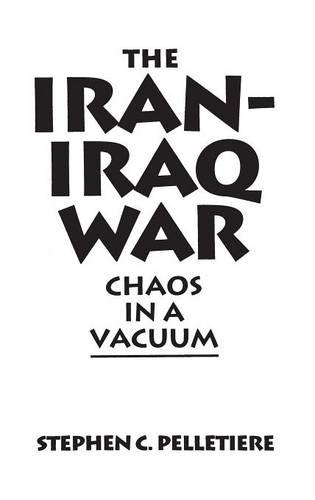
The Iran-Iraq War: Chaos in a Vacuum
(Hardback)
Publishing Details
The Iran-Iraq War: Chaos in a Vacuum
By (Author) Stephen C. Pelletire
Bloomsbury Publishing PLC
Praeger Publishers Inc
30th March 1992
United States
Classifications
Tertiary Education
Non Fiction
Middle Eastern history
955.054
Physical Properties
Hardback
192
Width 156mm, Height 235mm
397g
Description
This book is a major reinterpretation of the Iran-Iraq War, and is a source for reinterpreting the US involvement in the Gulf. Pelletiere argues that the war was not a standoff in which Iraq finally won a grinding war of attrition through luck, persistence and the use of poison gas. Instead, Iraq "planned the last campaign almost two years prior to its unfolding. (The Iraqis) trained intensively and expended enormous sums of money to make it (their effort) succeed. What won for them was their superior fighting prowess and greater commitment. Gas - if it was used at all - played only a minor part in the victory".
Reviews
. . . Pelletiere successfully counters the common perception that Iraq won a war of attrition through luck, persistence and the use of chemicals. . . . Pelletiere brings to light a fundamental element of the Iran-Iraq War ignored by those who attribute Iran's defeat to attrition, bad luck and chemical vulnerability. . . anyone wishing for a basic understanding of how the Hama Rule applies to the Iran-Iraq war should read this book.-Military Review
This is an instructive and well-written study of the first Gulf war, that seeks to go beyond the straight military or chronological approaches that have governed much of what has appeared on that conflict.-Middle East International
This military history of the Middle East's longest war, by a professor of national security at the US Army War College, pays some attention to political issues (e.g., Iraq's motivations in invading Iran, Iran's reliance on powerful ideological defense mechanisms, and the US's zigzag behavior during the war), but the book's long suit is its focus on the belligerents' strategy and tactics. The work may be compared to Anthony Cordesman and Abraham Wagner's major study, The Lessons of Modern War, Vol. 2: The Iran-Iraq War (1990). Pelletierre concludes that while the Iraqi army took six years to do it, it "had matured, it had become modern," because the General Staff finally figured out how to use and deploy the country's sophisticated weapons. With Saddam trying to micromanage the war, like Stalin after the Nazi invasion of the USSR, the Iraqis proved inept for a long time, but superior air power, US logistical and diplomatic support for Iraq (underplayed here), and the exhaustion of Iranian irregular forces, finally proved a winning combination. Pelletierre concludes with two somewhat contradictory observations: (1) the Iraqi army survived as a modern army after Operation Desert Storm, restoring Baghdad's authority in most of the country after the war; (2) Desert Storm created a power vacuum in the region akin to that produced after WW I, with the Americans filling it this time rather that the British.-Choice
." . . Pelletiere successfully counters the common perception that Iraq won a war of attrition through luck, persistence and the use of chemicals. . . . Pelletiere brings to light a fundamental element of the Iran-Iraq War ignored by those who attribute Iran's defeat to attrition, bad luck and chemical vulnerability. . . anyone wishing for a basic understanding of how the Hama Rule applies to the Iran-Iraq war should read this book."-Military Review
"This is an instructive and well-written study of the first Gulf war, that seeks to go beyond the straight military or chronological approaches that have governed much of what has appeared on that conflict."-Middle East International
"This military history of the Middle East's longest war, by a professor of national security at the US Army War College, pays some attention to political issues (e.g., Iraq's motivations in invading Iran, Iran's reliance on powerful ideological defense mechanisms, and the US's zigzag behavior during the war), but the book's long suit is its focus on the belligerents' strategy and tactics. The work may be compared to Anthony Cordesman and Abraham Wagner's major study, The Lessons of Modern War, Vol. 2: The Iran-Iraq War (1990). Pelletierre concludes that while the Iraqi army took six years to do it, it "had matured, it had become modern," because the General Staff finally figured out how to use and deploy the country's sophisticated weapons. With Saddam trying to micromanage the war, like Stalin after the Nazi invasion of the USSR, the Iraqis proved inept for a long time, but superior air power, US logistical and diplomatic support for Iraq (underplayed here), and the exhaustion of Iranian irregular forces, finally proved a winning combination. Pelletierre concludes with two somewhat contradictory observations: (1) the Iraqi army survived as a modern army after Operation Desert Storm, restoring Baghdad's authority in most of the country after the war; (2) Desert Storm created a power vacuum in the region akin to that produced after WW I, with the Americans filling it this time rather that the British."-Choice
Author Bio
STEPHEN C. PELLETIERE is Professor of National Security at the United States Army War College. He has written two of the most influential studies of the Iran-Iraq War--Iraqi Power and U.S. Security in the Middle East (with D.V. Johnson II and L.R. Rosenberger) and Lessons Learned: The Iran-Iraq War (with D.V. Johnson II)--which were circulated widely among the U.S. military during the Kuwait crisis. From 1982 until 1987 he was an intelligence officer in Washington working on the Iran-Iraq War.
